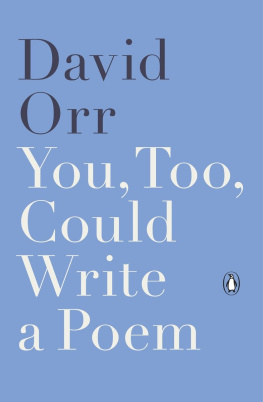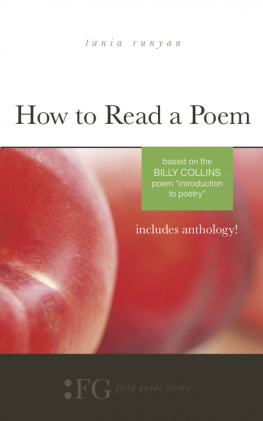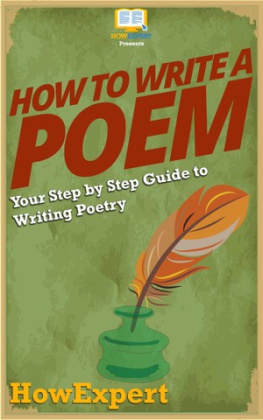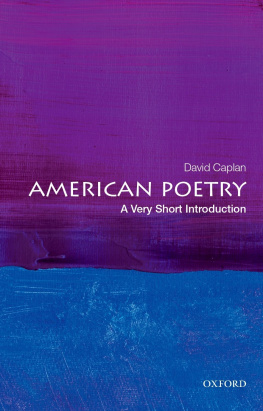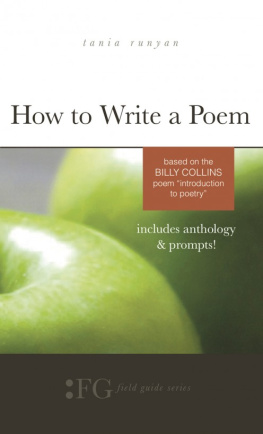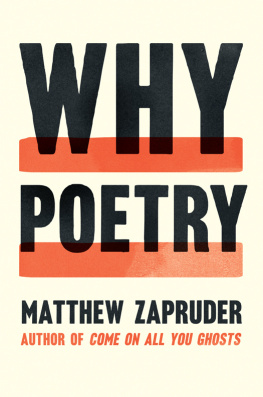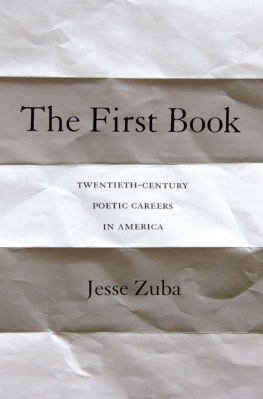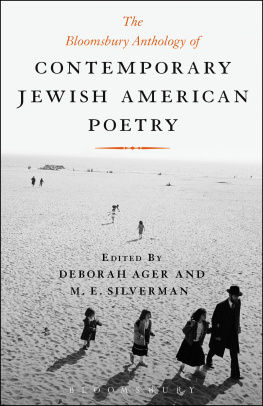PENGUIN BOOKS
An imprint of Penguin Random House LLC
375 Hudson Street
New York, New York 10014
penguin.com
Copyright 2017 by David Orr
Penguin supports copyright. Copyright fuels creativity, encourages diverse voices, promotes free speech, and creates a vibrant culture. Thank you for buying an authorized edition of this book and for complying with copyright laws by not reproducing, scanning, or distributing any part of it in any form without permission. You are supporting writers and allowing Penguin to continue to publish books for every reader.
Some of the reviews and essays in this book originally appeared in The New York Times, and to the extent they are reprinted here, they are reprinted with permission. Inquiries concerning permission to reprint any column or portion thereof should be directed to PARS International, 253 West 34th Street, 7th Floor, New York, NY 10001. The following selections originally appeared in The New York Times: You, Too, Could Write a Poem, The Age of Citation, Vendlers Yeats, Hit Parade, The Style of Luis de Gngora, The Happy Couplet, The Great(ness) Game, Oprahs Adventures in Poetryland, Annals of Poetry, School of Verse, The Virtues of Poetry: Longenbach and Papageorgiou, Louise Glcks Metamorphoses, The Obscurity of Michael OBrien, Too Close to Touch: Thom Gunns Selected Poems, Tomas Transtrmer and the Art of Translation, Rough Gems: The Uncollected Work of Elizabeth Bishop, The Letters of Ted Hughes, The Dream Logic of Matthea Harvey, Jack Gilberts Daily Devotions, The Neglected Master, The Trouble with Poetry, James Franco, Poet, On Robert Hass, Christopher Gilberts Improvisations, Matthew Zapruder and Rachel Wetzsteon, The Raw and the Cooked: Frank Stanford and Devin Johnston, The Collected Poems of Louise MacNeice, Versions of Zbigniew Herbert, The Poetry of Nabokov, Mary Jo Bangs Elegy, Jorie Graham, Superstar, The Notebooks of Robert Frost, Donald Justice, On Carl Phillips, Richard Wilburs Anterooms, Frederick Seidel, Scary Guy, Marie Ponsot.
Bad Guys, Poetry and, of, and About, Beach Reading, and Public Poetry: Four Takes originally appeared in Poetry.
The State of Contemporary American Poetry: An Allegory originally appeared in Virginia Quarterly Review.
How Far Can You Press a Poet? originally appeared in The Believer.
Ebook ISBN 9780698403338
Cover design: Darren Haggar
Version_1
For my family
CONTENTS
INTRODUCTION, AS A LIST OF THINGS I DONT LIKE
I dont like introductions to collections of criticism. A piece of criticism says, Here is a way to think. An introduction to an assortment of such pieces says, Here is how to think about the ways I asked you to think. Introductions like this one are like picture frames for picture frames, or a prescription-strength sheet of glass mounted in front of a rack of bifocals.
I DON T LIKE INTRODUCTIONS that are premised on a negativethings I dont likewhich plays into the assumption that critics are motivated by resentment. There is an old saying, often wrongly attributed to Michelangelo, the gist of which is that sculpting an elephant is easy: you just cut away everything that doesnt look like an elephant. Criticism is what cuts those pieces away when the elephant is an art form. Theres no resentment in thator, at least, theres more than resentment in that.
I DON T LIKE INTRODUCTIONS that are premised on the critics individualitythings I dont likewhich plays into the assumption that critics are motivated by vanity.
I DON T LIKE POETRY . I do likevery muchcertain poems and poets. Poetry is a lot like America, in the sense that liking all of it means that you probably shouldnt be trusted with money, or scissors.
I DON T LIKE POETRY criticism, unless its written by someone who cares about criticism almost as much as he cares about poetry, and who in the moment of writing cares more about the sentence hes constructing than about either one of them.
I DON T LIKE HEARING that some person or attitude or undertaking is good for poetry, which is a categorization that occurs with surprising frequency. Here is a list of things that have been good for poetry, in the sense that they almost certainly led individual poets to write better poems: prison, the death of a parent, catastrophically failed romance, the death of a child, violent political upheaval, religious persecution, the death of a spouse, depression, tuberculosis, devastating physical injury, the death of a friend, cancer, alcoholism, war, decades of loneliness, fantastic sex. Unless the person recommending something as good for poetry is offering the last item on that list, poets should check for exits.
I DON T LIKE HEARING that poetry is dying or dead. I particularly dont like it when its clear that the person making the claim hasnt bothered to so much as glance at any contemporary writing. That said, I also dont like hearing that such claims can be safely ignored because theyve been repeated over and over for eighty years. Poetry is an ancient art. Were it to die, it wouldnt vanish overnight. It would vanish like a town in a glaciers pathby inches, over lifespans.
I DON T LIKE MEMORIZING poetry, unless it happens by accident, as it sometimes does. Memorizing it on purpose makes me flash back to first grade and the Pledge of Allegiance.
I DON T LIKE THE word serious, particularly when its followed by criticism. The concept behind serious criticism is fineeveryone likes thoughtful writingbut in practice its often a way for people who read a great deal of poetry and poetry criticism to congratulate themselves at the expense of people who read very little (most of their fellow citizens, in other words, including a large number of people who are more intelligent and interesting than anyone currently inhabiting the poetry world). Its always good to remember that no art form gets to determine its own standingthat judgment will be rendered over time by readers on the arts periphery, who are always choosing among the temptations of many entertainments, many possible experiences.
I DON T LIKE THE assumption that where poetry is concerned, explanation is the highest form of criticism. American poetry does not currently suffer from a dearth of people keen to explain it.
I DON T LIKE THE distance between me and my much younger self, who once carried around Robert Hasss book Praise as if it were a talisman. Couldnt I see that the sentimentality of Meditation at Lagunitas isnt lessened by being acknowledged? That this actually makes it more sentimental?
I DON T LIKE THE way my older self feels the need to correct my younger self. Let the kid be a kid, Dad.
I DON T LIKE THAT when I asked several accomplished younger poets to give me the names of living poets they considered great (for the essay in this volume called The Great(ness) Game), the only poet their lists had in common was John Ashbery. Ashbery is a very fine writer, to be sure, but hes also eighty-nine years old. Its as if you surveyed poets in 1963 and the only name anyone could muster was Robert Frost.
I DON T LIKE THA T the work in this volume almost certainly overpraises several poets.
I DON T LIKE THAT the work in this volume is almost certainly too critical of several poets.
I DON T LIKE THAT Ive never written a full-length essay on Philip Larkin, a figure who appears here so often that I may as well have called the book

